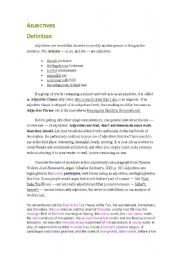
|
ADJECTIVES
Adjectives are words that describe or modify another person or thing in the sentence. The Articles — a, an, and the — are adjectives.
• the tall professor
• the lugubrious lieutenant
• a solid commitment
• a month´s pay
• a six-year-old child
• the unhappiest, richest man
If a group of words containing a subject and verb acts as an adjective, it is called an Adjective Clause. My sister, who is much older than I am, is an engineer. If an adjective clause is stripped of its subject and verb, the resulting modifier becomes an Adjective Phrase: He is the man who is keeping my family in the poorhouse.
Before getting into other usage considerations, one general note about the use — or over-use — of adjectives: Adjectives are frail; don´t ask them to do more work than they should. Let your broad-shouldered verbs and nouns do the hard work of description. Be particularly cautious in your use of adjectives that don´t have much to say in the first place: interesting, beautiful, lovely, exciting. It is your job as a writer to create beauty and excitement and interest, and when you simply insist on its presence without showing it to your reader — well, you´re convincing no one.
Consider the uses of modifiers in this adjectivally rich paragraph from Thomas Wolfe´s Look Homeward, Angel. (Charles Scribner´s, 1929, p. 69.) Adjectives are highlighted in this color; participles, verb forms acting as adjectives, are highlighted in this blue. Some people would argue that words that are part of a name — like "East India Tea House — are not really adjectival and that possessive nouns — father´s, farmer´s — are not technically adjectives, but we´ve included them in our analysis of Wolfe´s text.
Level:intermediate
Age: 14-17
Downloads:4 |
|
Copyright 12/3/2009 ceciliasierra
Publication or redistribution of any part of this
document is forbidden without authorization of the
copyright owner.
|


see more worksheets by ceciliasierra
|